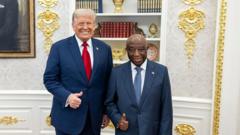Amid fears of a larger conflict, Israel and Iran have agreed to a cease-fire after 12 days of fighting, as announced by President Trump. The situation follows significant missile exchanges, leaving casualties on both sides. The details remain unclear as both nations navigate the aftermath.**
Israel and Iran Agree to Cease-Fire Amid Ongoing Tensions**

Israel and Iran Agree to Cease-Fire Amid Ongoing Tensions**
Tensions ease as a cease-fire is declared between Israel and Iran, following heavy missile exchanges. President Trump announces the agreement while both nations assess their next steps.**
Israel and Iran have officially declared a cease-fire following a tumultuous 12-day conflict that heightened concerns of escalating violence in the Middle East. The announcement came in simultaneous statements from both countries, with U.S. President Donald Trump playing a pivotal role in facilitating the truce.
The recent hostilities were marked by Iranian missile barrages targeting Israeli cities, including a devastating strike in Beersheba that resulted in multiple casualties. According to reports from Israeli emergency services, the attack claimed the lives of four individuals, while the overall damage included significant destruction to residential areas and vehicles.
The Iranian response included missile assaults on U.S. military facilities in Qatar, specifically targeting Al Udeid Air Base, which is the largest U.S. military installation in the region. Interestingly, Iranian officials asserted that the strikes were executed with prior warnings, aimed at minimizing casualties—a pattern reminiscent of Iran's previous military actions against American interests.
Amidst the chaos, President Trump took to social media to announce the cease-fire, urging both nations to maintain peace. Trump's declaration, however, caught some officials in his administration off guard, raising questions about the comprehensive acceptance of the agreement by both parties.
While Israel’s government has remained relatively silent following Trump’s announcement, Iranian state media reported the government’s acknowledgment of the cease-fire, framing it as a successful repercussion of their military efforts. The Iranian foreign minister suggested that military operations would cease if Israel halted its aggression first, indicating a conditional approach to the recent peace overtures.
The immediate aftermath of the cease-fire remains tenuous, as further missile strikes were reported shortly after the cease-fire declaration, leaving both nations in a precarious state. For now, the tension between Israel and Iran continues to loom large as observers watch closely for sustained peace and any developments regarding the broader regional implications of this agreement.





















